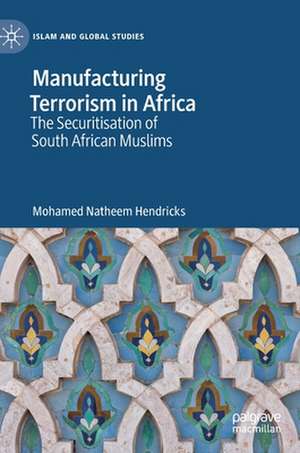Manufacturing Terrorism in Africa: The Securitisation of South African Muslims: Islam and Global Studies
Autor Mohamed Natheem Hendricksen Limba Engleză Hardback – 4 iul 2020
This book explores, particularly, how western-centred security discourses around Muslims has permeated South African security discourse in the post-apartheid period. It claims that the popular press and the local think-tank community were critical knowledge-sites that imported rather than interrogated debates which have underpinned policy-initiatives such as the GWOT.
Such theorisation seems contrary to the original architects of securitisation theory who maintain that issues become security concerns when institutional voices declare these as such. However, this book confirms that non-institutional voices have securitised the African Muslims by equatingthem with terrorism.
This book illustrates that such securitisation reproduces partisan knowledge that promote Western interests.
Preț: 698.80 lei
Preț vechi: 822.12 lei
-15% Nou
Puncte Express: 1048
Preț estimativ în valută:
133.71€ • 139.61$ • 110.67£
133.71€ • 139.61$ • 110.67£
Carte tipărită la comandă
Livrare economică 04-18 aprilie
Preluare comenzi: 021 569.72.76
Specificații
ISBN-13: 9789811556258
ISBN-10: 9811556253
Pagini: 180
Ilustrații: XVI, 247 p.
Dimensiuni: 148 x 210 mm
Greutate: 0.47 kg
Ediția:1st ed. 2020
Editura: Springer Nature Singapore
Colecția Palgrave Macmillan
Seria Islam and Global Studies
Locul publicării:Singapore, Singapore
ISBN-10: 9811556253
Pagini: 180
Ilustrații: XVI, 247 p.
Dimensiuni: 148 x 210 mm
Greutate: 0.47 kg
Ediția:1st ed. 2020
Editura: Springer Nature Singapore
Colecția Palgrave Macmillan
Seria Islam and Global Studies
Locul publicării:Singapore, Singapore
Cuprins
1. Prolegomenon: The White Widow—The Kenyan Westgate Mall Attack.- 2. The United State: Pivotal in the Terrorism Debate in Africa.- 3. Conceptualising Securitisation.- 4.The Invisible College.- 5. Expertise, Epistemes and the Construction of a Suspect Community.- 6. Writing Insecurity: Representations of Muslims and Islam in the South African Print Media.- 7. Conclusion.
Notă biografică
Dr Mohamed Natheem Hendricks, Senior Lecturer, Faculty of Education, University of the Western Cape, Cape Town, South Africa. His interest in security matters was sparked by debates related to Regional, Water and Human Security.
Textul de pe ultima copertă
“Theoretically sophisticated, empirically rich and always interesting, Manufacturing Terrorism in Africa adds greatly to our knowledge of the globally dominant terrorism discourse and its damaging effects on community relations and counterterrorism policy-making. Highly recommended.”
— Professor Richard Jackson, University of Otago, New Zealand
“Natheem Hendricks challenges the sensationalist media hysteria on so-called “Islamic terror in South Africa”. He also presents a much-needed corrective to a small coterie of so-called experts who spew Islamophobic tropes about a growing “Islamic terror threat in South Africa.”
— Dr. A. Rashied Omar, Kroc Institute for International Peace Studies, University of Notre Dame, USA
This book uses Securitisation Theory to explore how Muslims have been constructed as a security issue in Africa after the 9/11 attacks in the United States. These attacksbecame the rationale for the US’s Global War on Terror (GWOT). The centrality of Africa as an arena to execute the GWOT is the focus of this book.
This book explores, particularly, how western-centred security discourses around Muslims has permeated South African security discourse in the post-apartheid period. It claims that the popular press and the local think-tank community were critical knowledge-sites that imported rather than interrogated debates which have underpinned policy-initiatives such as the GWOT.
Such theorisation seems contrary to the original architects of securitisation theory who maintain that issues become security concerns when institutional voices declare these as such. However, this book confirms that non-institutional voices have securitised the African Muslims by equating them with terrorism.
This book illustrates that such securitisation reproduces partisan knowledge that promote Western interests.
Dr Mohamed Natheem Hendricks, Senior Lecturer, Faculty of Education, University of the Western Cape, Cape Town, South Africa. His interest in security matters was sparked by debates related to Regional, Water and Human Security.
— Professor Richard Jackson, University of Otago, New Zealand
“Natheem Hendricks challenges the sensationalist media hysteria on so-called “Islamic terror in South Africa”. He also presents a much-needed corrective to a small coterie of so-called experts who spew Islamophobic tropes about a growing “Islamic terror threat in South Africa.”
— Dr. A. Rashied Omar, Kroc Institute for International Peace Studies, University of Notre Dame, USA
This book uses Securitisation Theory to explore how Muslims have been constructed as a security issue in Africa after the 9/11 attacks in the United States. These attacksbecame the rationale for the US’s Global War on Terror (GWOT). The centrality of Africa as an arena to execute the GWOT is the focus of this book.
This book explores, particularly, how western-centred security discourses around Muslims has permeated South African security discourse in the post-apartheid period. It claims that the popular press and the local think-tank community were critical knowledge-sites that imported rather than interrogated debates which have underpinned policy-initiatives such as the GWOT.
Such theorisation seems contrary to the original architects of securitisation theory who maintain that issues become security concerns when institutional voices declare these as such. However, this book confirms that non-institutional voices have securitised the African Muslims by equating them with terrorism.
This book illustrates that such securitisation reproduces partisan knowledge that promote Western interests.
Dr Mohamed Natheem Hendricks, Senior Lecturer, Faculty of Education, University of the Western Cape, Cape Town, South Africa. His interest in security matters was sparked by debates related to Regional, Water and Human Security.
Caracteristici
Analyses the securitisation of Islam and Muslims in South Africa Confirms that Islam and Muslims in South Africa were constructed as security threats incrementally over an extended period Illustrates that the securitisation reproduces knowledge constructed in Western societies to promote specific interests



